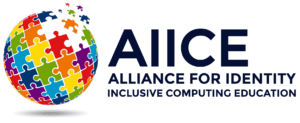“…I’ve been leaning in since birth.”
The daughter of a retired computer programmer and K-12 educator-turned-administrator, Dr. Nicki Washington was exposed to computer science (CS) at an early age, including programming in BASIC and PASCAL before high school. However, it wasn’t until she attended Johnson C. Smith University that she realized how unique her path was; specifically, having a mother and entire village of Black engineers surrounding and supporting her since she was born.
After completing her B.S. (’00), Nicki pursued her M.S. and Ph.D. from North Carolina State University (’02, ’05), becoming the first African-American woman to receive a Ph.D. in computer science from the university.
While her career has spanned both industry and academia (including IBM, The Aerospace Corporation, Howard University, Winthrop University, and Duke University), Nicki has often found herself one of the few Black women (if not the only) at the table.
Based on her personal, academic, and professional experiences, Nicki realized the paradigm required shifting. She has focused her career on changing not only what is considered CS, but also who is considered a computer scientist.
 She is currently the director of the Alliance for Identity-Inclusive Computing Education (AiiCE, pronounced “ace”), which aims to create systemic change in K-16 computing through interventions that decenter from historically marginalized students (based on race, ethnicity, gender, socioeconomic status, ability, and more) and instead target the people, policies, and practices impacting them. This cross-sector partnership includes several member organizations and strategic partners, and it includes approximately 200 affiliates.
She is currently the director of the Alliance for Identity-Inclusive Computing Education (AiiCE, pronounced “ace”), which aims to create systemic change in K-16 computing through interventions that decenter from historically marginalized students (based on race, ethnicity, gender, socioeconomic status, ability, and more) and instead target the people, policies, and practices impacting them. This cross-sector partnership includes several member organizations and strategic partners, and it includes approximately 200 affiliates.
 She also leads the internationally recognized Cultural Competence in Computing (3C) Fellows, which helps computing and STEM faculty, staff, postdoctoral researchers, graduate students, and professionals: 1) learn more about identity, intersectionality, racism, bias, and discrimination and how they impact academic environments; and 2) develop sustainable projects (courses, modules, and other activities) at their home institutions to foster more inclusive and equitable cultures.
She also leads the internationally recognized Cultural Competence in Computing (3C) Fellows, which helps computing and STEM faculty, staff, postdoctoral researchers, graduate students, and professionals: 1) learn more about identity, intersectionality, racism, bias, and discrimination and how they impact academic environments; and 2) develop sustainable projects (courses, modules, and other activities) at their home institutions to foster more inclusive and equitable cultures.
Her efforts to increase diversity, equity, and inclusion in CS have been funded by the Rathmann Family Foundation, National Science Foundation, and Department of Homeland Security, and they include working with numerous organizations, such as:
|
Listen to Nicki’s recent interview on The Space of Justice Podcast below! Additional interviews are available here.
